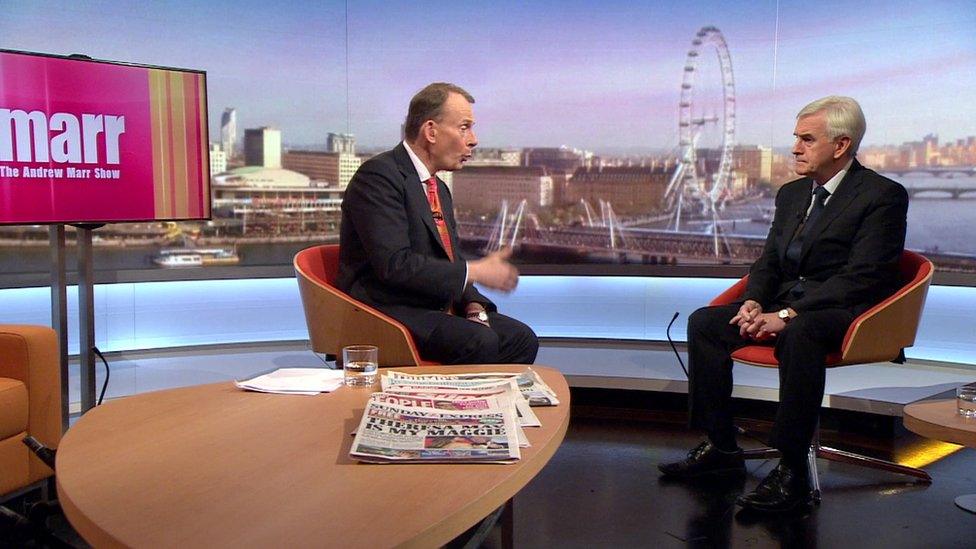Can Labour find an answer to its growing pains?
- Published
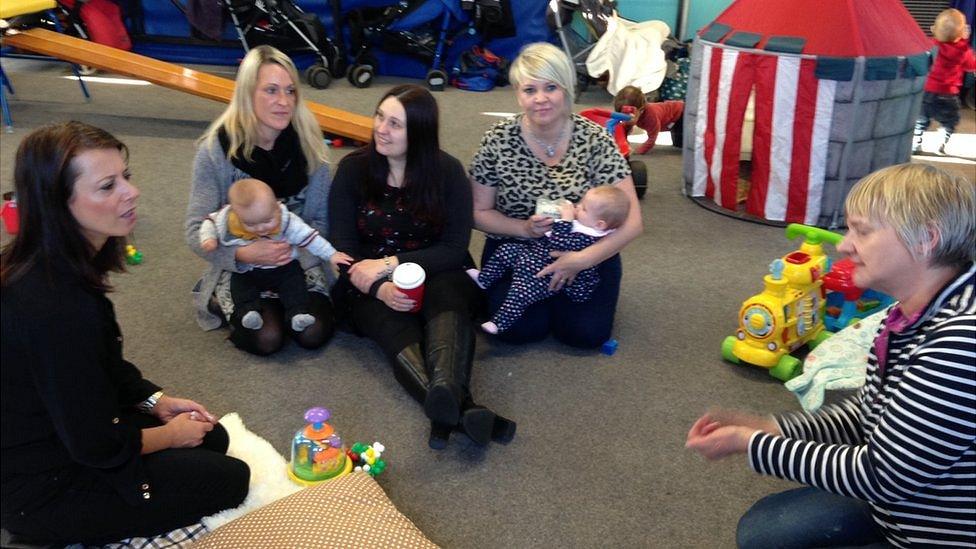
The NHS may not be the electoral weapon it once was for Labour
As Labour selects its candidate for the Stoke Central by-election, Iain Watson visits a heartland Labour seat in the Midlands to assess the state of the party.
"Ever since I could vote, I have voted Labour. This is the first time I am really - probably -going to change my mind," Mike tells Gloria de Piero, the Labour MP for Ashfield, in Nottinghamshire.
As Labour support has been eroding in the polls nationally, she is spending ten weeks talking to her constituents to find out where they think her party is going wrong - and what can be done about it.
She was particularly concerned because her electorate heavily backed Brexit - while she and most of her party supported Remain. She's aware that this could signal a wider disengagement with mainstream politics.
I joined her on a tour of her sprawling parliamentary seat, meeting every generation of voter (or indeed non-voter) from students to young mothers to pensioners.
'Protest group'
Mike is in his sixties and attends a lively, friendly lunch club in Trinity Methodist Church in the town of Kirkby. He is reluctant to change his vote but believes it is highly likely if Jeremy Corbyn stays in charge.
"He is turning Labour into a protest group like it was in the eighties - it is pretty unelectable. It has been taken over by a small minority."
Margaret was loyal to Labour until the 2015 general election but no longer, fearing that the Labour leader "doesn't share my values".
She declines to expand on that statement though some of her fellow diners believe the party under Jeremy Corbyn doesn't say enough about tackling immigration.
But the qualms about Labour's leadership go beyond policy and appear to focus on personality. Another Margaret - in her early eighties - talked approvingly of some previous Labour leaders.
When I asked her about the current leader she burst into sustained, almost uncontrollable, laughter, as though I had told the world's greatest joke.
She seemed to take the rather old-fashioned view that if you can't say anything nice about someone, it's better not to say anything at all.
But it came as something of a relief to Gloria de Piero that many of the older voters weren't prepared to abandon their tribal loyalties despite their doubts - "my father were a miner" was reason enough for one constituent never to question her vote.
Tribal disloyalty
But this adherence to Labour is not generation-proof. It is clearly becoming unstuck amongst younger voters.
West Notts college near Mansfield is an ambitious institution which has opened a new state of the art facility for degree students. It was there we met sociology and law students.
Some were yet to vote, others had cast their ballot for the first time in the EU referendum.
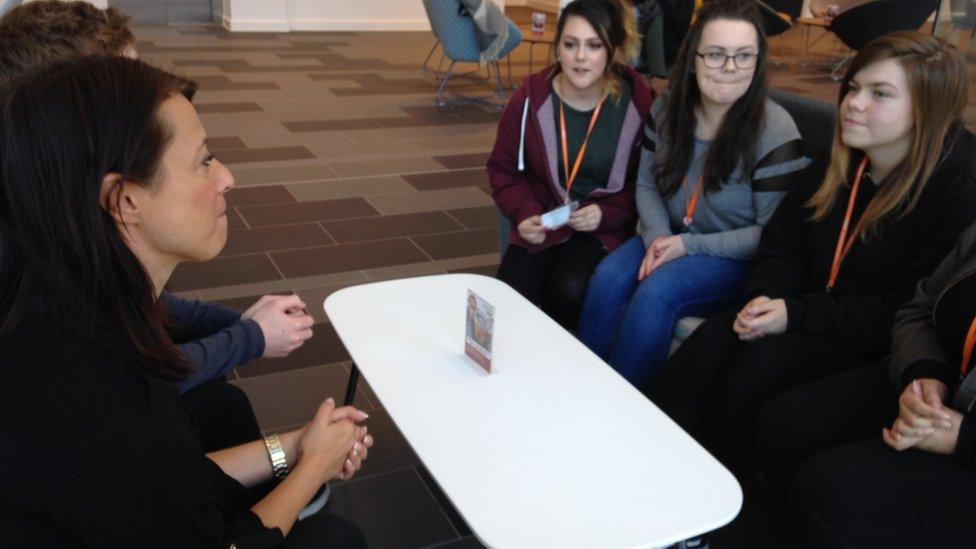
Labour is making little impression on younger voters
One of the older students had voted Labour - but her colleagues said they didn't know which party they would support, and one declared herself "confused" about politics.
They all had views on the future of their local community - especially on the need for more effective policing - but had little to say about national politics.
What was particularly striking wasn't their hostility to Jeremy Corbyn - it was the fact his leadership had made no impact on them whatsoever.
"I don't know who he is", declared Sally, and while Phoebe had heard of him - "he has got a big presence on social media" - she added: "to be fair, I don't know what he is actually saying".
Ed Miliband's former pollster James Morris has been commissioned by some Labour MPs - though not by the current leadership - and the Election Data website to examine the state of the party ahead of two crucial by-elections in Stoke Central and Copeland.
He has conducted focus groups and also collected quantative polling and he presented his findings to a select group of politicians at Westminster on Wednesday.
Voting blocs
He told me the lack of loyalty to Labour is becoming more widespread:
"In these seats which have traditionally been solid Labour with blocs of voters who used to work in manufacturing industry their affiliation with the party is now just a thread.
"The reason that some say they are still voting Labour is because they always have, or other people are doing it. In the past they would have other reasons, too - "it's the party of the NHS, it's the party that stands up for me" - and that is now going. Social norms are fraying and there is nothing to keep them there."
And he believes that the current leader is unlikely to acquire the ability turn this around:
"He lacks the rhetorical skill or the clear, defined positions which would give Labour a sense of identity."
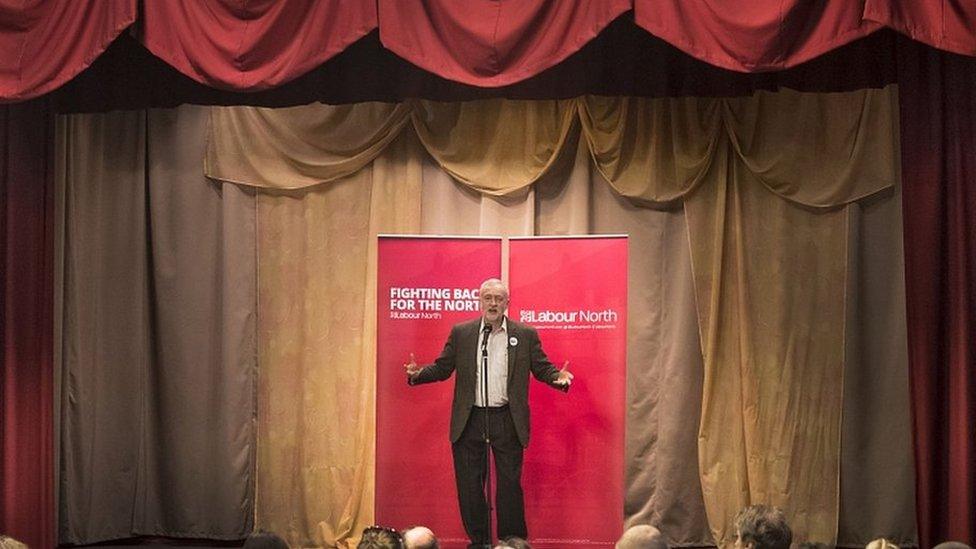
The party's problems runner deeper than its leadership, pollsters say
Indeed in his presentation to Labour MPs, James Morris revealed that more than a quarter of voters who backed Ed Miliband in 2015 think that Theresa May makes a better prime minister than Jeremy Corbyn would. Only about a third prefer the Labour leader while more than a third can't choose between them.
But for Gloria de Piero, Labour's difficulties precede - and potentially could post-date - Jeremy Corbyn's leadership.
"Labour has lost two elections. We need to wake and smell the coffee. Something has not been right for some time.
"Unless we answer the questions people have in post-industrial towns like the one I represent - how are we going to bring better jobs to heartland seats, how are we going to make people better off - unless we have answers people believe on those issues they won't buy in to us."
Brexit blues
She is interested in some of the underlying problems which her party is experiencing.
At the Little Chicks mother and toddler group in Selston, most of the women backed Brexit but they weren't clear where Labour stood - and some felt the party was more divided on the issue than the Conservatives.
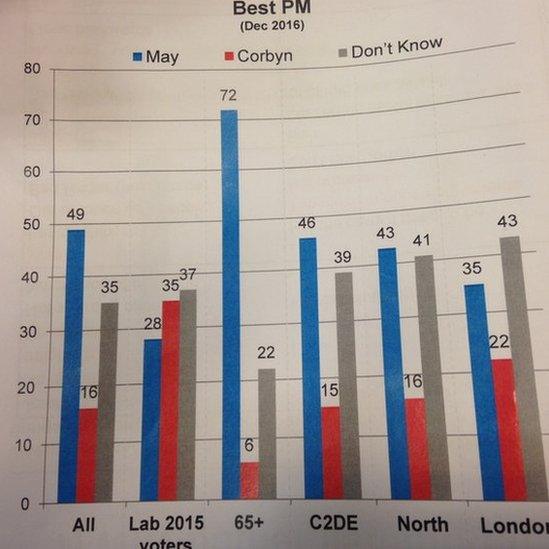
Research by Ed Miliband's former pollster makes disturbing reading for the party
Karen told her MP: "Labour are undecided. Some are for it, some are against. They are split."
This lack of clarity about Labour's position is widespread, according to James Morris, and it could bring dangers at the forthcoming by-elections:
"Labour has a real problem if electoral politics become defined by Brexit. The Lib Dems have a strong position against it, UKIP have a clear position in favour and Labour are somewhere in between.
"They are seen as too hard by liberal voters, but to socially conservative Brexit voters they look too soft. Labour is in a real bind if Brexit drives people's decisions when they come to vote for an MP."
Labour strategists recognise that the backdrop of Brexit will make the Stoke Central and Copeland by-elections far more challenging than they should be.
NHS resonance
But what Gloria De Piero has been picking up is that the tried and tested rallying cry for Labour voters - defend the NHS - is having less resonance than before.
At the toddlers' group, one mother complained about "how pushed" the midwife was when she was having her child; one of the students at West Notts college recounted her five hour wait in A&E only to be given a paracetamol; and a pensioner at the lunch club said her son was sent home from hospital with a life-threatening condition.
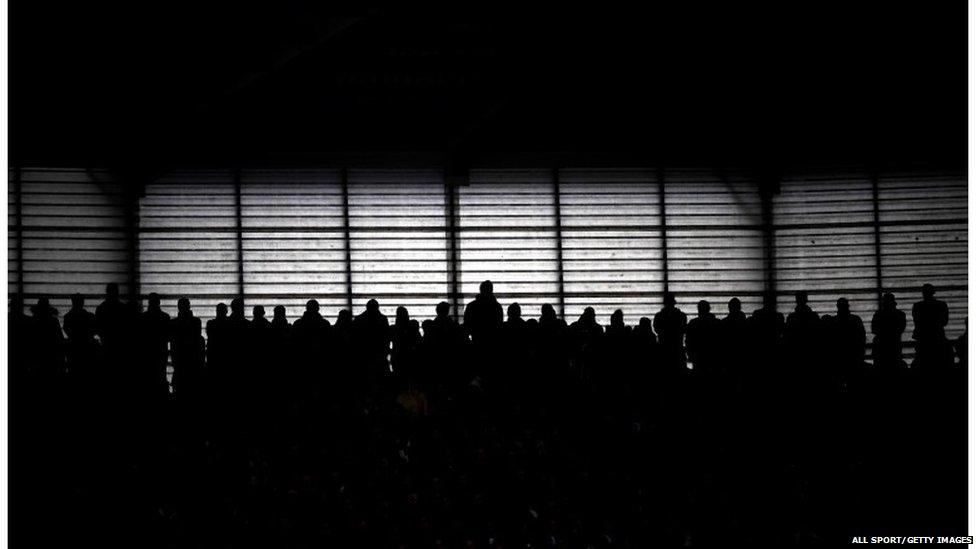
Labour risks being eclipsed in its post-industrial heartlands such as Stoke
Asked by Gloria de Piero who might be to blame for the current state of the NHS, the government or government ministers weren't mentioned at all.
The most common response was "don't know" - a 'lack of staff' was another; while a brace of older voters felt the pressures of immigration were perhaps taking their toll.
Gloria de Piero's conclusion is "this shows me just how much work we have to do£.
"People recognise that there are problems in the NHS but they are not putting the blame at the government's door. We assume we are lot further ahead on this issue than we actually are."
Keeping a distance
As well as presenting his research, James Morris also dispensed advice to Labour MPs on how to cope with a more hostile political environment.
He urged them to be seen more as community campaigners and not to be afraid to distance themselves from the party line:
"There is a limit to what an MP can do to overcome a wave of public opinion. Having said that, there are things individual campaigning MPs can do. They need to be seen as authentic and not a party apparatchik.
"That means they will say different things in different places. They need to have their own positions more so than they did in the past and they must mean it."
I asked him if that risked the party's coherence, but he was blunt in replying "the party doesn't have coherence".
But so far diagnosing Labour's electoral pains has been easier than prescribing a cure.
And the prospect of potential defeat in one or two Labour-held seats in next month's by-elections makes this all rather urgent.
- Published24 September 2016
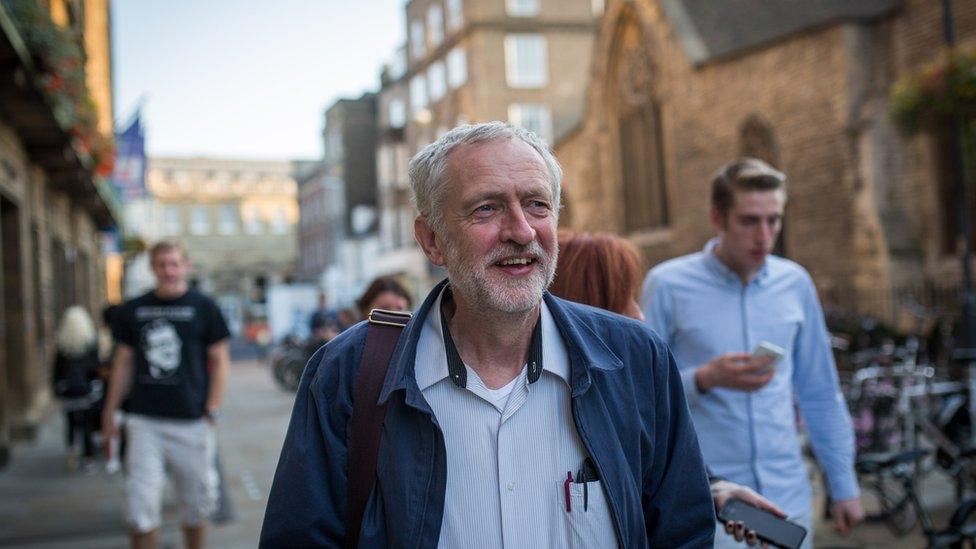
- Published22 January 2017
